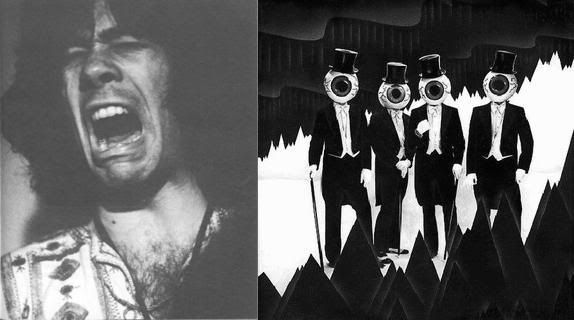the "Production Quality" of an album
Printed From: Progarchives.com
Category: Other music related lounges
Forum Name: Tech Talk
Forum Description: Discuss musical instruments, equipment, hi-fi, speakers, vinyl, gadgets,etc.
URL: http://www.progarchives.com/forum/forum_posts.asp?TID=18062
Printed Date: November 24 2024 at 13:33
Software Version: Web Wiz Forums 11.01 - http://www.webwizforums.com
Topic: the "Production Quality" of an album
Posted By: altaeria
Subject: the "Production Quality" of an album
Date Posted: January 27 2006 at 11:25
|
I've read on numerous occasions how an album would deserve a higher "rating" if it's production values were better. Granted, I do completely understand that the sound quality of an album can be an important factor... but I don't understand why everything HAS to have such a pristine overly-compressed sound to be considered "professional" anymore. I read (in a review on this site) that the production was really poor on Mahavishnu Orchestra's "Inner Mounting Flame" album ... and it kinda annoyed me for some reason. THAT's the real charm of the album--the sheer RAWNESS of it all! In fact--it sounds acoustically accurate to me. If it was mixed and mastered like some Kenny G "jazz" album, it would simply lose all its balls. Then, I read somewhere how someone thought that the first Asia album had production problems. Are you kidding me? It couldn't be any more polished and still sound REAL. It seems like everybody has forgotten what music really sounds like... you know... like when it's PLAYED live by an ACTUAL BAND in front of you... NOT sequenced and manipulated by computers. Propagating the concept that all recordings have to reach "perfect" commercial standards is probably another reason for the lame popular music scene overall. Big record companies with the money to access the best Mastering facilities are not going to risk signing experimental bands with interesting ideas. It's not safe. Instead, those bands have to use Joe's corner recording studio to make their album... and nobody wants to take it seriously because it's not perfectly mastered like the Green Day songs that are forced down their throats on radio and TV. When did Electrical Engineering become a prerequisite for Rock'n'Roll anyway? It just makes me sad.
|
Replies:
Posted By: MikeEnRegalia
Date Posted: January 27 2006 at 12:06
|
I also appreciate good production quality. But that doesn't mean that I like an "pristine overly-compressed sound" - not at all. There are some albums from the 70s which have an absolutely amazing sound - DSOTM for instance. Then there also are some really terrible "DDD" - CDs with the problems that you describe. And then there also are really good modern productions.
------------- https://awesomeprog.com/users/Mike" rel="nofollow">Recently listened to: 
|
Posted By: hawkbrock
Date Posted: January 27 2006 at 12:31
|
That Mahavishnu album is a dawg! I have a rip from an original LP of it... but it adds some charm to the live fusion sound of the band. I don't know becuase I haven't heard pristine versions of the tracks. ------------- 
|
Posted By: bluetailfly
Date Posted: January 27 2006 at 13:10
I wholeheartedly agree. For example, when I see reviews of KC's "Earthbound" and all the reviewer does is rag on the production values, I realize that the reviewer is completely hung up and can't get past it to enjoy the great inspired jam that the musicians are creating. I mean sure it's nice to have that pristine sound quality, but if the music is good, you don't need it. The listener just needs to get past that predjudiced initial reaction. ------------- "The red polygon's only desire / is to get to the blue triangle." |
Posted By: The-Bullet
Date Posted: January 27 2006 at 21:56
|
As one who gets a tad confused over the term "producer" on some albums, I would enjoy reading a comprehensive "job description" of a record producer. It seems the term applies equally to a sound engineer as well as to someone who totally reworks the artist or songwriters intentions. And then there's Union ------------- 
"Why say it cannot be done.....they'd be better doing pop songs?" |
Posted By: chromaticism
Date Posted: February 06 2006 at 08:03
As a side note, I think Robert Fripp's way of producing (his raw-sounding production method) is his way of capturing the essence of any musical work as if it was being heard or performed live. ------------- http://www.sterilium.tk - Challenging music for the thinking and inquisitive mind |
Posted By: Blacksword
Date Posted: February 14 2006 at 09:44
|
I hate hearing music with 'pristine overly compressed sound' it's the worst trype of production there is IMO. It removes the human element from the music and makes it sound like it was created by a computer. It's all down to personal taste, I guess, but I like an album to sound 'organic' rather than machine made...if you know what I mean.. ------------- Ultimately bored by endless ecstasy! |
Posted By: BaldFriede
Date Posted: February 14 2006 at 11:29
|
I couldn't care less about production quality. The stereo equipment I had for half of my life was sub-standard; why, in the beginning I didn't even have a stereo equipment! All I had was a primitive tape recorder. And this "clean" sound is so bloodless and inhumane it leaves me absolutely cold. The same is true for live concerts, by the way. Some of the best concerts I ever attended were given by bands with a rather poor equipment; the first concert I ever witnessed was by Here and Now in the early eighties, when I was 12. It was fantastic, but their equipment was battered and torn. There is a certain level of sound quality, below which it becomes hard to listen to an album, in my opinion. But that level is nowhere where some people want to put it. When I read complaints about the "bad production quality" of albums like "Foxtrot", for example, I can only shake my head in amazement. -------------  BaldJean and I; I am the one in blue. |
Posted By: oliverstoned
Date Posted: February 14 2006 at 15:02
|
It doesn't matter for 99.9% of people, but you would amazed
by what a great system could do. Eventually, the problem i'm faced to is that my system is too good for most of the "rock" Cd i play on. Jazz and classical, and some fusion (ECM) Cds are overall much better sounding. Rock Cds are bumped for mr everybody's nasty system. To make low on a system without low. |
Posted By: limeyrob
Date Posted: February 14 2006 at 15:28
|
I suppose I am included in this, given some of my comments harping on about snare drumming - assuming that is what you call it. But there are many albums that, for me, are almost unlistenable because of the heavy crash of this drum. I also suspect, but have no evidence, that it is also bad for the hearing. My theory being - The snare drum is more often than not played between notes of other instruments - maintaining the beat. Therefore there is no other sound to mask its impact. The sound of the drum has all its energy at the front of the crash. Presumably if looked at on an oscillascope the line would rise almost vertically when the drum is hit - giving the ear no time to prepare for the sound. Repeat this over the length of an album and the ear takes some pounding. I listen at low volumes and can certainly feel it. It probably is me, but cripes it don't arf bug me. Not to mention the number of albums I haven't bought because of the drumming when I hear them from PA streams. |
Posted By: oliverstoned
Date Posted: February 14 2006 at 15:38
You mean analog. With flesh, sound matter. Unlike the skeleton numeric sound. |
Posted By: Blacksword
Date Posted: February 14 2006 at 17:24
Yes, analog is indeed what I meant. ------------- Ultimately bored by endless ecstasy! |
Posted By: Certif1ed
Date Posted: February 15 2006 at 03:32
|
I saw Here and Now many times during the late 1970s-1980s, and went to a huge number of free festivals, usually featuring Hawkwind, where just about all of the equipment was second hand, begged or borrowed - and the sounds that were made were amazing - and that was before I'd taken anything... I love the quality of sound on "Foxtrot" (at least, on the original, first press vinyl |
Posted By: oliverstoned
Date Posted: February 15 2006 at 10:08
| There may be confusion between the original recording quality released of 70s albums(on vynil) and the Cd reissue which is often bad, without talking about inherent CD/numeric format limitations. |
Posted By: Certif1ed
Date Posted: February 15 2006 at 15:41
|
Early CD releases were particularly poor - especially where the Analogue source wasn't converted to digital early in the chain. The older Genesis CDs I have all claim to be AAA, which is nonsense, of course - at some point the music had to be digitised to get it onto CD, and in the meantime, the rich sound of the master tapes got mangled by the multi-stage analogue processing, and finally crushed by inferior early digital technology. But first presses of Genesis albums sound fantastic... until you get to the end of the side. They just tried to squeeze too much music onto a limited format. I'd guess the original reels sound better. |
Posted By: AtLossForWords
Date Posted: February 15 2006 at 19:21
|
I'm going to say that the recording science of music has become more developed in the past ten years that any other science of music. It's not often that we see major breakthroughs in guitar, basses, drums, and now even keyboards, but in the studio, there is constant innovation finding ways to make bands sound better. We've had analog recording and now we have pro tools, digital performer, and many other digital programs capturing the sound in more authentic levels. Digital recording for one has made recordings much cleaner, this dosen't take into account all of the improvements pre-amp, equalizers, compressors, and microphones have gone through. The more modern the relase, the clearer, and more innovative I expect it to sound. Now that all this equipment is available to bands, I think they need to make the best and most innovative use of it. -------------  
"Mastodon sucks giant monkey balls." |
Posted By: oliverstoned
Date Posted: February 16 2006 at 06:19
|
« Early CD releases were particularly poor - especially where the Analogue source wasn't converted to digital early in the chain.”
This may be an explanation. However, all that is quite complex and there’s no absolute rule. Indeed, early CDs were bad in general, due to the fact that early numeric technology was not mature. Although, there’s a very bad trend these days in rock CDs, (without talking about over compression) which is to bump outrageously the low, cause most people have systems without low, and it sounds quite good that way on Mr everybody nasty system. With my neutral system featuring a subwoofer, that’s another story. So, sometimes, you find yourself with a remastered version which is better in terms of image (sound scene) , dynamic, details, transparency, even quite soft highs (for numeric!) but at the same time, you get a ridiculous over bumped low, which does the big drum foot like an earthquake in my house with my 38cm sub. And of course, bumping the low that way doesn’t makes a tight bass/drum but a low which dribble, and the bass line is not intelligible as it could be on a more neutral and equilibrated CD. Talking about AAD, ADD or DDD issue, even If I quite agree with what’s saying up, there are other factors which make no absolute rule there, except that current recording in DDD have often less harshness due to the fact that there are less steps, no analog/numeric conversion , which is often a source of degradation when it’s not well done. On another hand, we know that some artists use the old Big Studer recorders (designed in 1967 for Sergent Pepper) for the initial recording and mixing . What’s important is the care they take (power filtering, cabling in studio also counts) and often they take little care, especially in the rock world. Some engineers don’t even care about power phase, thinking it’s an audiophile joke. Engineers are far more serious in the jazz or classical field, and the results are there, in term of final CD quality. I was naively thinking that everything was carefully made in studio, and I was quite surprise to learn that they use kilometres of poor entry level “Monster” cables, for example. |
Posted By: BaldFriede
Date Posted: February 16 2006 at 06:49
|
I have heard so-called "excellently produced" albums on first-class stereo systems, and it didn't impress me at all. People tend to forget that the best stereo system is inside their heads.
-------------  BaldJean and I; I am the one in blue. |
Posted By: MikeEnRegalia
Date Posted: February 16 2006 at 07:05
|
^ yes ... we should focus on the music, not on the medium. ------------- https://awesomeprog.com/users/Mike" rel="nofollow">Recently listened to: 
|
Posted By: oliverstoned
Date Posted: February 16 2006 at 07:06
|
I believe you.
Unfortunatly, real good hifi is very rare, cause it requires a knowledge that very few have, especially dealers. I've been to hifi shows and all was very bad. I've heard 1 million dollars systems sound like a train station. But when you know how to do a great system, with tube in the highs, great source, excellent cables, power optimization, vibration cancelling...to name a few. It can be fantastic...but of course a good listening is better than any speech. Unfortunatly, you won't hear that in any hifi shop. It's an esoteric world hard to access. Believe me, a Moerlen's drum solo on my system would makes you believe that Pierre is still alive, there in the room, and you would feel each of its percussion right in the solar plexus. |
Posted By: MikeEnRegalia
Date Posted: February 16 2006 at 07:09
|
------------- https://awesomeprog.com/users/Mike" rel="nofollow">Recently listened to: 
|
Posted By: oliverstoned
Date Posted: February 16 2006 at 08:15
|
No, exactly the contary, nothing to do with some "boom boom".
It's the dryness and the quickness of the percussion's impact, the deepness of the low, like the real drum in live. The quickness is related to dynamic. For example, when i upgraded from my little Nad CD player to my current separate drive/converter digital set up, i was amazed that how music seems to be played two times faster than before. And it's very pleasant!! it makes music far more present and lively. |
Posted By: MikeEnRegalia
Date Posted: February 16 2006 at 09:06
|
^ I know what you're talking about, but I think that this is mostly related to amp/cabinets. Of course you need really good (and heavy) cabinets, and an amp which is able to recreate all the dynamics of the source. ------------- https://awesomeprog.com/users/Mike" rel="nofollow">Recently listened to: 
|
Posted By: oliverstoned
Date Posted: February 19 2006 at 04:44
|
...on another hand, there are some engineers who know their job, like Bob Ludwig who done the beautiful Stones remasters, for example.
|
Posted By: Tool/Rush/Mars
Date Posted: March 01 2006 at 14:13
|
i tend to like live albums more. I really don't go for superior quality when I record.
|
Posted By: Marcos
Date Posted: February 23 2007 at 08:31
|
I think the sound (quality) is important, but no essencial. In addition, I think the music that we listened is associated to a sound, and it's irreplaceable. For example, the symphonic-rock of 70´s couldn't be the same with 90's technology ------------- www.postmortemweb.com.ar |
Posted By: Guests
Date Posted: February 23 2007 at 12:41
Quite agree - most people, inevitably, will be listening on equipment not worthy of the task of reproduction and pretty much anything will struggle to sound impressive. Until you get a top notch hi-fi you have no idea how good music can actually sound. I have now reached the point that any further upgrades will barely be noticeable. Prior to arriving in this enviable position I had a relatively good system but was still astounded when I managed to move higher up the scale. It was akin to having a completely new music collection. Things, hitherto familiar to me, actually sounded like a different recording.
Since when does "well-produced" mean compressed sound? That is actually the antithesis of "well-produced". A good production means creating an aural soundscape which should enable the listener to pick out any given instrument and follow it's course throughout the piece of music. It should have a spatial quality but still sound as in unison. What this creates is a soundstage that will swell way beyond the physical boundary of the speakers - the sound actually appearing to spread much wider than the distance between the speakers. There should also an apparent addition to the depth of the soundstage – appearing to emanate further back than your rear wall. This, however, CANNOT be attained by production alone - you do need a good system to achieve the desired effect. If you want a better explanation of this, read the wonderful book "The Complete Guide To High-end Audio" by Robert Harley. I have heard the term over-produced. This, again, is a misnomer. They cannot be over-produced but they can be poorly produced - creating a sterility which grates on the ear. I would add that I'm talking about new albums. It is hard to re-master or re-produce old recordings without some detrimental effect. The loss of hiss can result in a clipping of treble tones, rendering a neutral, less exciting sound. Having said this, not many new prog albums are well produced - in fact most are quite poor, suffering from that so-called compressed and constricted sound. I presume there is a cost factor to creating a top class production. and lets face it, not many prog bands make money! |
Posted By: mystic fred
Date Posted: February 26 2007 at 07:58
|
i have both digital (using cd player as a source) and analogue (using a record deck) systems which i often compare from time to time so i know the difference, and digital really has come a long way from the horrible compressed muddy sound in the 80's, i bought a cd player but then but took it back i was so disappointed .
"compressed" digital is, i gather, what downloaded music sounds like ie "pinched" like the sound from a Minidisc or DAB player. i could easily tell the difference in a blindfold test, but digital is catching up fast, it is becoming difficult to differentiate with some recordings! both mediums have their pros and cons, but a lot depends on the mastering.
incidentally, digital is also catching in the imaging world too - the average 8 mp digital photos can now challenge medium format film in picture quality, leaving 35mm way behind.
-------------  Prog Archives Tour Van Prog Archives Tour Van 
|
Posted By: rileydog22
Date Posted: February 26 2007 at 20:13
|
I don't really care about production. That's why I like bootlegs so much.
-------------   |
Posted By: 1800iareyay
Date Posted: February 26 2007 at 20:18
| Production can hinder a good album, but it can't reduce the album's power. Quite a few metal recordings suffer from poor production yet the sheer quality of the music ensures I (and many others) will buy it. |
Posted By: Certif1ed
Date Posted: February 27 2007 at 07:56
Compression has been in use before digital technology came along - most frequently on bass, I believe.
Now compression is over-used everywhere - but it's part of "the modern sound". Everything is turned up to make it sound louder and "more in your face", then compressed to stop it distorting.
It's a bit of an art, because too much compression leads to noticeable "dips" in the sound, but, since the average listener doesn't notice, most producers these days seem to use what I would consider excessive compression to get the "blinging" sound.
I've since come to actually prefer the more ragged sound of mostly uncompressed late 1960s-early 1970s recordings, which are also far more dynamic and exciting to listen to, IMO.
Maybe you could consider the use of excessive compression as "over-produced".
Certainly, if you listen to something that's really well produced like, say, a Coldplay album, or if that's too much for you to bear, an early Pink Floyd, Led Zeppelin or Beatles album (on its native vinyl), you can hear what it's like when the music hasn't had the life compressed out of it even on lowly equipment.
Good sounds can be produced on a budget without compression - Twelfth Night's "Live at the Target" was recorded on a mobile setup (I was there!), and still sounds great - if a tad toppy, and Necronomicon's "Tips Zum Selbstmord" was recorded on a very tight budget - but sounds absolutely amazing, if your head's inthe right space.
But every time I hear the compressor kick in to suppress overly dynamic tracks, I run a mile.
The other truly awful invention is pitch correction.
Why can't people sing in tune in the first place, or just sing with real feeling?
Everytime I hear the familiar ring of Antares correcting a slight wobble it drives me mad.
Engineering "mistakes" out of the music?
Now THAT's over-production! ------------- The important thing is not to stop questioning. |
Posted By: Guests
Date Posted: February 27 2007 at 13:13
Granted that's too much of an interference but I would not call that over-production as it is a negative process and yet again it is BAD production. Production should be (should be) a positive process that gives the music room to breathe. I would prefer a different word for processes such as compression and the like - possibly Re-duction?
|
Posted By: Certif1ed
Date Posted: February 28 2007 at 04:23
|
^Unfortunately, it's been called compression since forever - even the devices you use to do it are called compressors.
A compressor does reduce, but it reduces according to a ratio: If a signal exceeds a certain threshold, then the dynamic range of that signal is literally squashed, not simply reduced.
Think of a file compression program, like WinZip.
It uses a special algorithm to do things such as strip repeated bits from a file (statistical redundancy) and replace these with markers and data fields so that when it uncompresses the file, it can replace the data in the exact place it removed it from.
What this does is to reduce the file size by shrinking the file - but not the data that the file contains, so the file remains virtually intact.
*Note that this is not the only way a compression algorithm works - but it is the simplest to understand.
Consider also the compression used in mp3 files - it doesn't reduce the length of the piece or the contents, although lossy compression by definition reduces quality.
A high bitrate mp3 file, though, may sound pretty close to the raw audio source, but the file size is greatly reduced. However, it is still virtually the same piece of music.
Compare this to compressing tarmac, or anything else that's physical - you don't actually reduce the amount of matter, but you do make the thing smaller.
------------- The important thing is not to stop questioning. |
Posted By: James Lee
Date Posted: March 03 2007 at 13:13
The original 'compressors' were the guys running the board- real flesh fingers on the sliders, trying to anticipate when to push up and when to pull back.  The whole point of audio compression is to keep the volume peaks manageable and bringing up quieter sounds so they don't get lost. With analog signals, the distortion caused by overloading the peaks actually results in 'natural' compression, which can be musically useful at times (just ask Alan Parsons). With digital signals, even a little distortion is too much, so compression and limiting (extreme compression that cuts off the peak) have become much more of a necessary tool. Check out Metamorfosi's Inferno album for extreme 1970's compression. But on the main topic, I agree that a well-produced album is one where you can hear the details of the music. I don't need that in everything- I have a lot of bootlegs and recordings made with bad equipment, bad recording conditions, or simply bad engineering skills  . And I'd far rather listen to Earthbound than Heavy Construkction despite the latter's much improved sonic qualities... . And I'd far rather listen to Earthbound than Heavy Construkction despite the latter's much improved sonic qualities...I kinda feel sorry for oliver, who can't enjoy music unless it is perfectly reproduced. But if you are a jazz/ classical fan, that's probably a viable outlook. I've got too much rock and roll in me.  ------------- http://www.last.fm/user/sollipsist/?chartstyle=kaonashi"> 
|
Posted By: heyitsthatguy
Date Posted: March 03 2007 at 13:16
|
For the most part, if a record is produced badly, it pisses me off to no end. However, I'll still listen to it, and if reviewing it, I'll review it only for the music
------------- 
|

 altaeria wrote:
altaeria wrote:


 ), and could care less whether it meets particular standards or if there are glitches in there - the overall effect on the music provides a wonderful "retro" feel, and I would miss it if it was ever "cleaned up".
), and could care less whether it meets particular standards or if there are glitches in there - the overall effect on the music provides a wonderful "retro" feel, and I would miss it if it was ever "cleaned up".